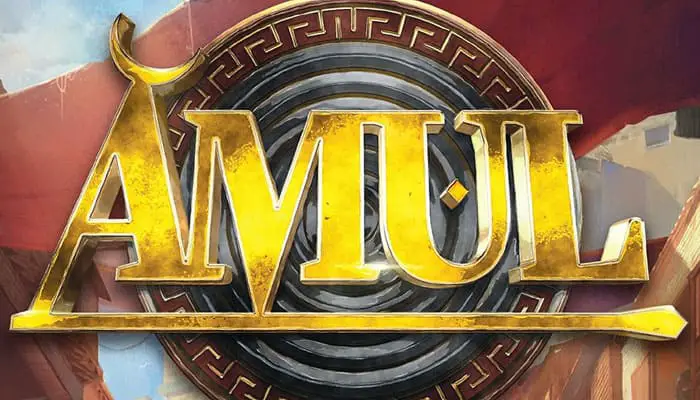
In the game of Amul, players are merchants competing for wealth and prestige. Each round, players simultaneously choose one card in their hand and place it in the market. Then, everyone gets to pick one card from the market to place in their hand.
Once everyone has picked a card, each player must play a card in their personal play area. But only certain cards score when played on the table and others should be kept in hand for end game scoring.
Components

- 146 Market cards
- 16 Palace cards
- 9 Bazaar cards
- 1 Starting Player card
- 1 First Pick card
- 1 Round Tracker card
- 8 Round Summary cards
- 1 Game Board
- 1 Scoring Pad
- 1 Card Reference
- Rulebook
Card Details

Setup
1 Prepare the cards according to your player count: A small blue circle in the lower right corner of every PMOe, Bazaar, and Market card indicates the minimum number of players with which the card is used. Return any unused cards to the box.

2 Set up the Palace by placing each Palace card faceup next to the Palace side of the Game Board.
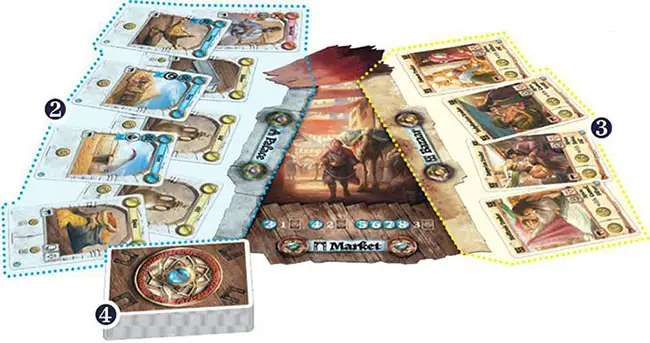

3 Set up the Bazaar by placing each Bazaar card faceup next to the Bazaar side of the Game Board.

4 Shuffle the Market cards facedown to form a Market deck. Place the deck near the Market side of the Game Board.
5 Deal 5 Market cards facedown to each player as a starting hand.
Note: Players may freely look at their own cards but should always keep them hidden from the other players.
6 Give each player a Round Summary card.
7 Choose a Starting Player randomly and give that player the Starting Player card, the First Pick card, and the Round Tracker card. Put the Starting Player card on top of the Round Tracker card so that only the number one is showing.

8 Note: Each player should reserve some space on the table in front of them. This will be their personal play area, into which they will play a card each round.
Any cards played into the play area should always be visible to all players.
You are now ready to start.
Game Play
The game is played for 9 rounds. After the 9th round, cards are scored and the player with the most Prestige points wins.
Each game round consists of three consecutive phases: replenish, planning, and upkeep.
Replenish Phase
Deal

At the beginning of each round, including the first, the Starting Player deals 1 Market card from the Market deck to each player.
Reminder: Players should now have 6 Market cards in their hand.
Fill the Market
Deal Market cards from the Market deck faceup on the table next to the Market side of the Game Board, according to the number of players as follows:
- 3 players: 1 card
- 4 players: 2 cards
- 5 to 8 players: 3 cards
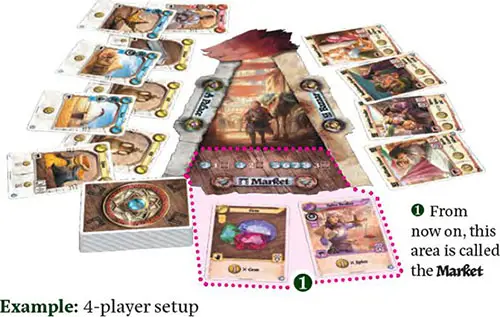
Note: The Palace and the Bazaar are never refilled.
After Filling the Market, proceed to the planning phase.
Planning Phase
Offer
Each player simultaneously chooses one of the Market cards in their hand and adds it facedown to the Market. When all players have placed a card in the Market, turn all cards added by the players faceup.
Pick
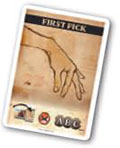
Starting with the player holding the First Pick card, each player in clockwise order chooses one of the faceup cards in the Market and adds it to their hand.
Important: After playing a number of rounds equal to the number of players, players with Military Prowess get to pick their cards first.
Note: You may not choose a card from the Palace or from the Bazaar.
Reminder: When all players have picked a card from the Market, they should again have 6 Market cards in their hand.
Reveal

Each player simultaneously chooses one of the Market cards in their hand and places it facedown in their personal play area.
Note: The players should aim to choose a card that has a play area icon  in the left margin.
in the left margin.
Once all players have chosen a card, they each reveal their card faceup in their play area. If the card that the player reveals has a play area icon  , the player keeps it in their play area. If the card only has a hand icon
, the player keeps it in their play area. If the card only has a hand icon  , it is immediately removed from the game. Some Market cards have both symbols and can be retained in the play area.
, it is immediately removed from the game. Some Market cards have both symbols and can be retained in the play area.
Note: The rest of your cards stay in your hand. You can use them for an Offer or Reveal in any upcoming Planning Phase. Cards with a hand icon  can also be saved in hand for end game Scoring.
can also be saved in hand for end game Scoring.
Hint: Pay attention to which cards other players Offer, Pick, and Reveal. Many cards are scored based on what players have in their hands, so some information related to scoring will stay hidden until the end of the game.
Reminder: Each player should now have 5 Market cards in their hand and (typically) as many cards in their play area as rounds of play.
After all players have revealed a card, proceed to the Upkeep phase.
Upkeep Phase
Resolve Immediate Effects
If any cards with immediate effects were played this round, resolve them in clockwise order, beginning with the player holding the First Pick card.
Important: After playing a number of rounds equal to the number of players, players with Military Prowess get to resolve their cards first.
Depending on the card played, its effect allows the player to take a card either from the Palace, the Bazaar, or the Market (see the Card Reference booklet for further details). Effects are the only way of acquiring Palace and Bazaar cards.
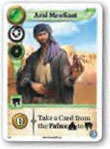
Note: The following cards have immediate effects: Arab Merchant, Mongol Merchant, Contract, Scavenger, and Mughal Warlord.
Empty the Market
Remove any cards remaining in the Market from the game.
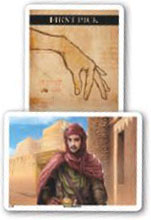
Pass the First Pick Card
Move the First Pick card to the next player in clockwise direction.
Note: The Starting Player card is never moved.
Progress
The Starting Player slides the Round Tracker card to show next round number.
You are now ready to start a new round with the Replenish phase.
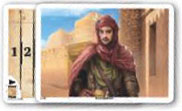
Military Prowess
When the First Pick card returns to the player holding the Starting Player card (this happens when you have played as many rounds as you have players), Military Prowess comes into effect. For the remainder of the game, player order will be determined in a new way:
Important: Players with Military Prowess will pick a card from the Market and resolve immediate effects before those who do not have Military Prowess. The symbols on the First Pick card serve as a reminder of this.
A player's Military Prowess is the total number of Military Prowess symbols  they have on the cards in their play area.
they have on the cards in their play area.
Example: Linda has played these cards into her play area. Her Military Prowess is now 3.
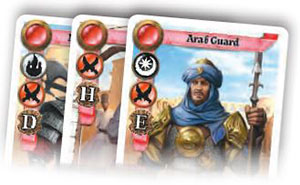
The player with the highest Military Prowess goes first. In the case of a tie, alphabetical order of Pick Order symbols ( ..). determines Military Prowess player order.
..). determines Military Prowess player order.
Example: Lukas has played these cards into his play area. He now has 3 Military Prowess. Because his best Pick Order symbol is  he goes before Linda, whose best symbol is
he goes before Linda, whose best symbol is  .
.
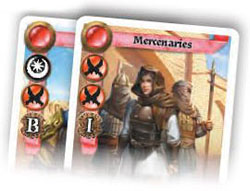
Note: When all players with Military Prowess have chosen a card, those who have no Military Prowess pick theirs in normal player order. The First Pick card continues to move from player to player and still determines player order for those with no Military Prowess.
The same adjusted player order applies to picking cards from the Market during the Planning Phase and resolving any immediate effects during the Upkeep Phase.
End of the Game
After 9 rounds, the game ends. All players remove from the game all cards in their hand that do not have a hand icon  in the left margin. The rest of the cards in their hand are placed in their play area.
in the left margin. The rest of the cards in their hand are placed in their play area.
Reminder: All players will now (usually) have 5  cards and 9
cards and 9  cards (plus any cards gained by resolving effects) in their play area.
cards (plus any cards gained by resolving effects) in their play area.
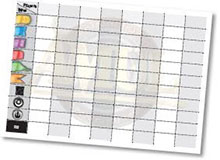
Note: Many cards have variable scoring. Refer to the Card Reference booklet for detailed scoring instructions.
Choose one player to act as a bookkeeper who fills in the Scoring Pad row by row.
Market and palace Cards
When the bookkeeper calls out a card color, each player scores each card of that color in their personal play area.
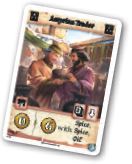
Bazaar Cards
When the bookkeeper calls out the Bazaar cards  , each player scores each Bazaar card in their personal play area.
, each player scores each Bazaar card in their personal play area.
Majorities
When the bookkeeper calls out a majority scoring, each player counts the number of
corresponding symbols on their cards.
There are two separate majority scorings. The players with the most Arab symbols  , as well as the players with the most Mongol symbols
, as well as the players with the most Mongol symbols  score as follows:
score as follows:
- 1st rank: 8 Prestige points
- 2nd rank: 4 Prestige points
- 3rd rank: 2 Prestige points
If several players have the same number of symbols and therefore tie for a rank, these players get the Prestige points of the lowest of their shared ranks.
The player with the most Prestige points wins the game.
In the case of a tie, the player with higher Military Prowess wins.
Game Variant: Tea
Note: In the regular game of Amul, by the end of the game, every card will either have been dealt to the players or to the Market.
Therefore, skilled players will be able to build strategies knowing that a specific card will be available for a specific combination unless taken by an opponent. No card will be left out of the game by chance.
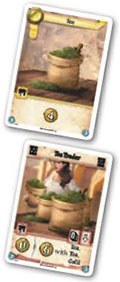
Players desiring more variance and chance in their gameplay may introduce a new product to the game - Tea. The setup for the variant game is the same as for the normal game, but Tea cards are added to the Market deck and the Tea Trader is added as an extra card in the Bazaar.
The recommended number of added Tea cards is equal to the number of players, but players are free to experiment with any number of their choosing.
Reminder: At the end of the 9th round, a number of Market cards equal to the added Tea cards should be left in the Market deck.
Continue Reading


